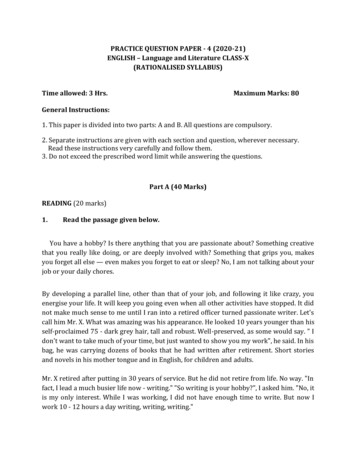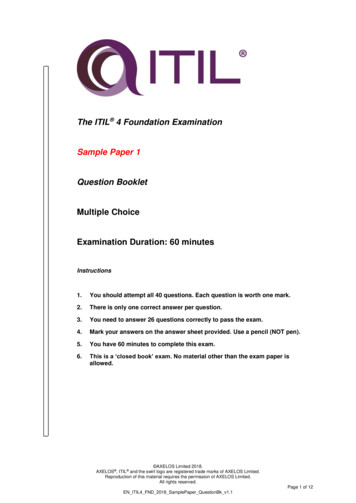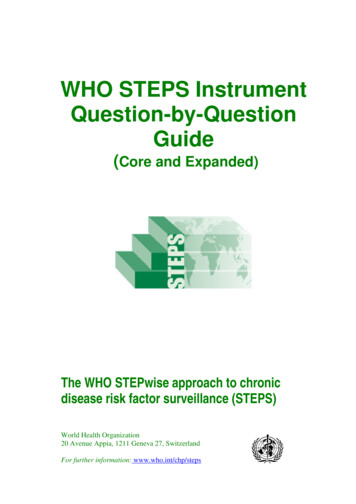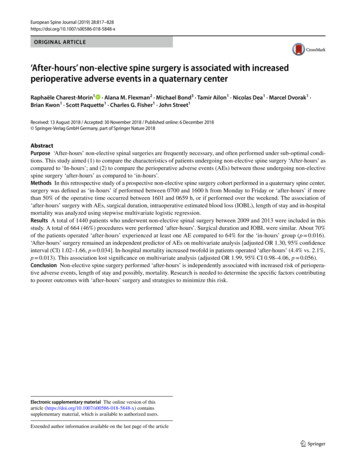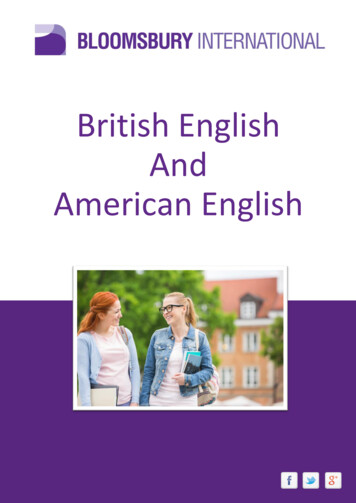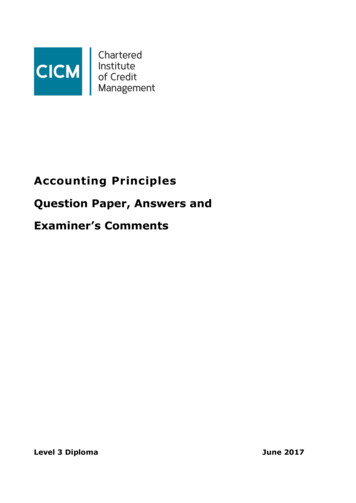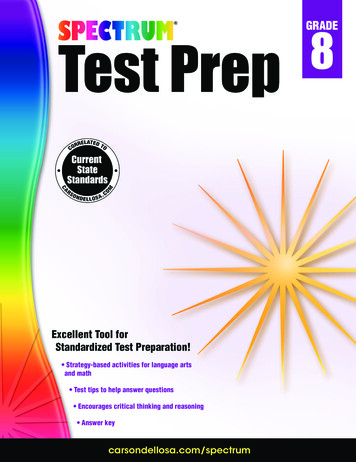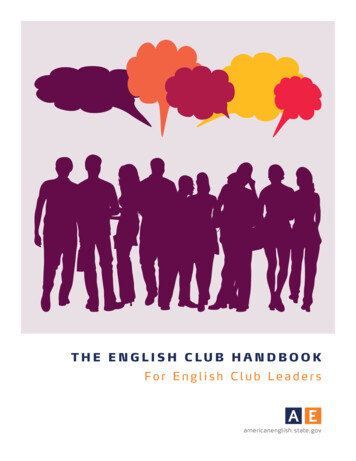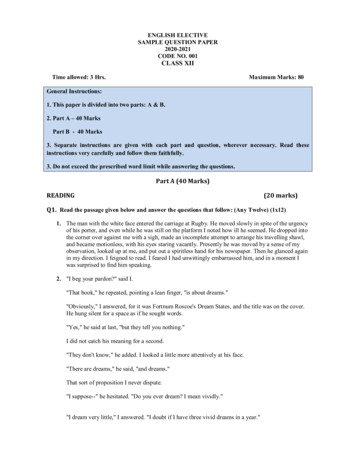
Transcription
ENGLISH ELECTIVESAMPLE QUESTION PAPER2020-2021CODE NO. 001CLASS XIITime allowed: 3 Hrs.Maximum Marks: 80General Instructions:1. This paper is divided into two parts: A & B.2. Part A – 40 MarksPart B - 40 Marks3. Separate instructions are given with each part and question, wherever necessary. Read theseinstructions very carefully and follow them faithfully.3. Do not exceed the prescribed word limit while answering the questions.Part A (40 Marks)READING(20 marks)Q1. Read the passage given below and answer the questions that follow: (Any Twelve) (1x12)1. The man with the white face entered the carriage at Rugby. He moved slowly in spite of the urgencyof his porter, and even while he was still on the platform I noted how ill he seemed. He dropped intothe corner over against me with a sigh, made an incomplete attempt to arrange his travelling shawl,and became motionless, with his eyes staring vacantly. Presently he was moved by a sense of myobservation, looked up at me, and put out a spiritless hand for his newspaper. Then he glanced againin my direction. I feigned to read. I feared I had unwittingly embarrassed him, and in a moment Iwas surprised to find him speaking.2. "I beg your pardon?" said I."That book," he repeated, pointing a lean finger, "is about dreams.""Obviously," I answered, for it was Fortnum Roscoe's Dream States, and the title was on the cover.He hung silent for a space as if he sought words."Yes," he said at last, "but they tell you nothing."I did not catch his meaning for a second."They don't know," he added. I looked a little more attentively at his face."There are dreams," he said, "and dreams."That sort of proposition I never dispute."I suppose--" he hesitated. "Do you ever dream? I mean vividly.""I dream very little," I answered. "I doubt if I have three vivid dreams in a year."
"Ah!" he said, and seemed for a moment to collect his thoughts."Your dreams don't mix with your memories?" he asked abruptly."You don't find yourself in doubt; did this happen or did it not?""Hardly ever. Except just for a momentary hesitation now andthen. I suppose few people do.""Does he say--?" He indicated the book."Says it happens at times and gives the usual explanationabout intensity of impression and the like to account for its not happening as a rule. I suppose youknow something of thesetheories--""Very little--except that they are wrong."3. His emaciated hand played with the strap of the window for a time. I prepared to resume reading,and that seemed to precipitate his next remark. He leant forward almost as though he would touchme."Isn't there something called consecutive dreaming--that goes on night after night?""I believe there is. There are cases given in most books on mental trouble.""Mental trouble! Yes. I daresay there are. It's the rightplace for them. But what I mean--" He looked at his bonyknuckles. "Is that sort of thing always dreaming? Is it dreaming?Or is it something else? Mightn't it be something else?"4. I should have snubbed his persistent conversation but for thedrawn anxiety of his face. I remember now the look of his faded eyes and the lids red stained-perhaps you know that look."I'm not just arguing about a matter of opinion," he said."The thing's killing me.""Dreams?""If you call them dreams. Night after night. Vivid!—so vivid . . . this--" (he indicated the landscapethat went streaming by the window) "seems unreal in comparison! I can scarcely remember who Iam, what business I am on . . . ."He paused. "Even now--""The dream is always the same--do you mean?" I asked."It's over.""You mean?""I died.""Died?"
5. "Smashed and killed, and now, so much of me as that dream was, is dead. Dead forever. I dreamt Iwas another man, you know, living in a different part of the world and in a different time.I dreamt that night after night. Night after night I woke into that other life. Fresh scenes and freshhappenings--until I came upon the last--""When you died?""When I died.""And since then--""No," he said. "Thank God! That was the end of the dream. . "6. It was clear I was in for this dream. And after all, I had an hour before me, the light was fading fast,and Fortnum Roscoe has a dreary way with him. "Living in a different time," I said: "do you meanin some different age?""Yes.""Past?""No, to come--to come.""The year three thousand, for example?""I don't know what year it was. I did when I was asleep, whenI was dreaming, that is, but not now--not now that I am awake.There's a lot of things I have forgotten since I woke out of these dreams, though I knew them at thetime when I was--I suppose it was dreaming. They called the year differently from our way ofcalling the year . . . What did they call it?" He put his hand to his forehead. "No," said he, "I forget."He sat smiling weakly. For a moment I feared he did not mean to tell me his dream. As a rule I hatepeople who tell their dreams, but this struck me differently. I proffered assistance even."It began--" I suggested.7. "It was vivid from the first. I seemed to wake up in it suddenly. And it's curious that in these dreamsI am speaking of I never remembered this life I am living now. It seemed as if the dream life wasenough while it lasted. Perhaps--But I will tell you how I find myself when I do my best to recall itall. I don't remember anything clearly until I found myself sitting in a sort of loggia looking out overthe sea. I had been dozing, and suddenly I woke up--fresh and vivid--not a bit dreamlike--becausethe girl had stopped fanning me."On the basis of your reading of the above excerpt, choose the correct option to answer thefollowing questions : (Any Twelve)(i) How did the man with the white face behave as he entered the carriage?a. Excited and enthusiasticb. Scaredc. Excited and nervousd. showed no enthusiasm(ii) What was the name of the book which the narrator was reading?a. Fortnum Roscoe's Dream Statesb. Dream Statesc. Dreams of the Statesd. State of the Dream
(iii) What was the man’s opinion about the theory of dreams given in the narrator’s book?a.He felt that it was all correctb.He felt the book painted a wrong picture.c.He felt that the book explained nothing.d.He felt that the book was confusing(iv) Why couldn’t the narrator snub the man’s conversation?a. The narrator liked listening to conversations.b. The book which he was reading was lost.c. The man with the white face looked anxious.d. The man begged him to listen.(v) What is NOT the reason for narrator being interested in listening to the man’s description of hislast dream?a. The man’s dream was about an alien.b. It was getting darkc. The narrator had still an hour’s journey left.d. His book was getting boring.(vi) What did the man NOT say about the last dream which he had?a. It was a dream which wasn’t clearb. He was sitting in the loggiac. His last dream was very cleard. He would wake up in these dreams suddenly.(vii) Choose the correct option:Which of the following is NOT true for the Man with the white face?a. He moved around slowlyb.He looked sicklyc. He didn’t want to talk about his dream.d. He didn’t believe in theories of Fortnum Roscoe's Dream States(viii)"I dream very little," I answered. "I doubt if I have three vivid dreams in a year. This linehighlights that the narrator did not –a. Have normal dreamsb. Good sleep pattern.c. Give much importance to the science behind dreams.d. like talking to the man with the white face(ix) Choose the synonym of thin (para 3)a. precipitateb. knucklesc. emaciatedd. resume(x) Choose the antonym of dull(para 7)a. Profferedb. vividc. assistanced. loggia(xi) Choose the right answer which explains the underlined phrase:He hung silent for a space as if he sought words.a. he was at a loss of words.b. he was indecisivec. he was left hanging because of his indecisiveness
d. he stayed silent for sometime as if he searched for words.(xii) “I feigned to read” impliesa.b.c.d.I feared reading.I pretended to read.I ignored reading.I continued to read.(xiii) ‘Proffered’ meansa. hold out or put forwardb. to obtain somethingc. to project somethingd. to establish the validity(xiv) The word which is a synonym of ‘boring’ in para 6 isa. fadingb. fastc. drearyd. weakly(xv) The man in his dream lived in thea. Present Ageb. Futurec. Pastd. Jacobean eraQ2. Read the poem given below and choose the correct option to answerthe questions which follow: (ANY FOUR)I SING the song of the great clean guns that belch forth death at will."Ah, but the wailing mothers, the lifeless forms and still!"I sing the song of the billowing flags, the bugles that cry before."Ah, but the skeletons flapping rags, the lips that speak no more!"I sing the clash of bayonets, of sabres that flash and cleave."And wilt thou sing the maimed ones, too, that go with pinnedup sleeve?”I sing acclaimed generals that bring the victory home."Ah, but the broken bodies that drip like honey-comb!"I sing of hosts triumphant, long ranks of marching men."And wilt thou sing the shadowy hosts that never march again?"(i) What are the two feelings being contradicted in the poem?a. Sadness and prideb. Happiness and pridec. Excitement and Prided. Lethargy and enthusiasm(ii) The poem is set in the midst ofa. Industrial Revolutionb. Political Protestc. Ward. peaceful demonstration(iii) Who all don’t seem to be rejoicing in the poem?(I) Ranks of Marching men(II) Generals4 marks(1 x 4)
(III) Handicapped soldiers(IV) Mothers of the deada.b.c.d.I and IIIII and IIII and IVII and III(iv) What do the great clean guns do?a. they belch forth Victoryb. they belch forth deathc. they belch forth sadnessd. they belch forth energy(v) Who and what are the symbols of victory in the poem?(I) great clean guns, billowing flags(II) bayonets and sabres(III) Acclaimed Generals(IV) triumphant Hostsa.b.c.d.I, II, III & IVI & IIII & IIIIII & IVQ3A. On the basis of your reading of the passage and other visual inputs,choose the correct option to answer the questions which follow: (AnyFOUR)Status of domesticated elephantsRecords indicate that the management of domesticated elephants inNepal has a long history and is said to have begun in 1903. At one timethere were 31 elephant camps throughout the lowlands of Nepal. Thecapture and training of wild animals was a common practice in the past.A total of 17 domesticated elephants were released into the wild in1914 and 10 wild elephants were captured for domestication during1954-1970.Although the reason for releasing elephants into the wild is notmentioned in reports, it can be assumed that those elephants werereleased because of the difficulty of finding them work and because oftheir old age.Table 1. Elephant populations at ten year intervals between 1903 and1973Years1903 1913 1923 1933 1943 1953 1963 1973No. of elephants 328 234 198 199 180 136 80 47Fig. 1. Declining trend of domesticated elephant populations at ten-yearintervals between 1903 and 19734 Marks(1x4 4)
(i) The data presented in the passage has been compiled with the help of .a. Hearsayb. People’s opinionc. Official Recordsd. Passage does not specify(ii) On analyzing elephant population data, their population has found to bea. decreased over the yearsb. remained the samec. increased over the yearsd. increased in year 1943(iii) What were the reasons for releasing the elephants into the wild?a. Old age and government ordersb. Shortage of work and government ordersc. Government orders and shortage of spaced. Old age and shortage of work(iv) What peculiar thing was observed in the year 1933?a. A slight increase in the number of domesticated Elephants.b. A slight decrease in the number of domesticated Elephants.c. No change.d. It stays the same as the decade 1923.(v) Where were most of the elephant camps located?a. The Himalayasb. Lowlands of Nepalc. Lowlands of Assamd. Terai region of Gorakhpur***FOR VISUALLY IMPAIRED CANDIDATES IN LIEU OF Q3AQ3B. Read the passage given below and answer the questions whichfollow1. Based on a novel by Jay Parini, The Last Station deals with thesomewhat unedifying last months of the 82-year-old Leo Tolstoy(Christopher Plummer) that concluded with his public death at theremote southern Russia railway station of Astapovo in 1910, the end ofthe line and the last station of the cross. During this time his wife Sofya(Helen Mirren) battles for his soul and the copyright of his valuableworks with the writer's manipulative disciple Vladimir Chertkov (Paul
Giamatti), who regards himself as the guardian of the great man'sreputation and wants the money from War and Peace to be used toadvance the cause of universal love and passive resistance. Their battlesare observed and recorded by Tolstoy's new secretary, ValentinBulgakov, played by James McAvoy with the same amiable diffidencehe brought to the role of Idi Amin's confidant in The Last King ofScotland.2. The events were documented in copious diaries kept by theparticipants and by newsreel cameramen from all over the world, andthe film is well acted, handsomely designed and bizarrely comic in amanner more Chekhovian than Tolstoyan. The opening titles tell us thatTolstoy was the world's most famous novelist and widely regarded as aliving saint, and it is just as well to be reminded, because he comes overas a rather ludicrous Lear-like fool: pompous, ill-tempered, insensitive,constantly talking of love but rarely practising it.(i) Which character does Christopher Plummer play in the movie?a.Vladimir Chertkovb.Leo Tolstoyc.Valentin Bulgakovd.James McAvoy(ii) The last Station is based on the novel bya.Leo Tolstoyb.Jay Parinic.Sofya Tolstoyd.Helen Mirren(iii) James McAvoy, in The Last Station plays the role ofa.Idi Amin’s Confidantb.Tolstoy’ New Secretaryc.Tolstoy’s Discipled.Idi Amin’s Disciple(iv) What was the bone of contention between Sofya and Vladimir?a.Fight for Tolstoy’s moneyb.Fight for Tolstoy’s mansionc.Fight for Sofya’s moneyd.Copyright of Tolstoy’s works(v) What does the movie ‘The last Station’ focus on?a.Childhood of Leo Tolstoyb.Last months of Tolstoy’s lifec.Tolstoy’s marriage to Sofyad.School life of TolstoyQ4.Transform the following sentences as per the given instructions.(Any Eight)(i) Ramesh consulted his parents before accepting the job offer.8 Marks[1x8 8]
(Begin: Ramesh did not .)a.b.c.d.Ramesh did not consult his parents before accepting the job offer.Ramesh did not accept the job offer on the consultation of his parents.Ramesh did not accept the job offer without consulting his parents.Ramesh did not consult his parents before acceptance of his job offer.(ii) The memory is so vivid that I will never forget it.(Use ‘too’ in place of ‘so’)a.b.c.d.The memory is too vivid to be forgotten.The memory is vivid too to be forgotten.The forgetting is too vivid for the memory.The memory is so vivid, that I too can’t forget it.(iii) Food and sleep were all we cared about.(Begin: All .)a.b.c.d.All food and sleep was worth caring for.All food and no sleep we cared for.All we cared for was food and sleep.All food and sleep was liked by all.(iv) Sameer said, “Ramesh, can you help me with my homework?”(convert into Indirect speech)a.b.c.d.Sameer asked Ramesh if he could help him with his homework.Sameer ordered Ramesh to help him with his homework.Sameer asked Ramesh that if can help him with her homework.Sameer asked Ramesh if can help him with his homework?(v) Not only did he buy a desktop but also a laptop.Use ‘Besides’ a.b.c.d.Besides a laptop he buy a desktop.Beside a laptop , a desktop was purchased by him.Besides a desktop, a laptop was purchased.Besides a desktop, he bought a laptop.(vi) ‘I’ll do it tomorrow,” he promised(Rewrite in Indirect Speech)a.He promised that I will do it tomorrow.b.He promised that he would do that the next day.c.He promised that he will do it the next day.d.He promised that he would do it tomorrow.(vii) The bee is more industrious than all the other creatures.(Use most industrious )a.The bee is more most industrious creature of all.b.The bee is most industrious of all creatures.c.The bee is more industrious than most industrious.d.Most industrious is the bee.
(viii) Will she deliver the message?a.b.c.d.(Convert into passive)Will the message be delivered by him?Will the message be delivered by her?Would the message be delivered by her?Will a message be delivered by her?(ix) His bodyguards are checking out the bathroom.(Begin The bathroom )a.b.c.d.The bathroom is being checked by the bodyguards.The bathroom has been checked by the bodyguards.The bathroom was being checked by the bodyguards.The bathroom had been checked by the bodyguards.(x) “I’m ashamed of your behaviour!” shouted my father in anger.(Rewrite in Indirect Speech)a.b.c.d.My father shouted in anger that he was ashamed of my behaviour.My father shouted in anger that he was ashamed of your behaviour.My father shouted in anger that I am ashamed of your behaviour.My father commented that I was ashamed of his behaviour.(xi) All nooks and corners were checked(Begin No nooks and corners .)a.b.c.d.No nooks and corners were checkedNo nooks and corners were searched.No nooks and corners were left unchecked.No nooks and corners were left.(xii) Their dog is too friendly to be an effective guard dog.(Begin Their dog is so .)a. Their dog is so effective so as to be a friendly dog.b. Their dog is so friendly that it cannot be an effective guard dog.c. Their dog is so friendly in order to be an effective guard dog.d. Their dog is so friendly and an effective guard dog.Q5. Choose the correct answer from the options given with any 12 of thefollowing questions. Attempt Any Twelve.12 Marks(Any Twelve)[1x12 12](i) The play Chandalika is based on the famous Buddhist legend ofBuddha’s disciple nameda. Vikramab. Ratnac. Satyamd. Ananda(ii) Name the poem from which the following lines are taken:“That love hath not attain’d the high’st degree,
Which is still diligent lest others see.a.b.c.d.Poems by MiltonPoems by BlakeA Lecture upon the ShadowThe Wild Swans at Coole( iii) In ‘I sell my dreams’,‘I’ referred to .a. Frau Friedab. Pablo Nerudac. Gabriel Garcia Marquezd. Eveline(iv) Where was Eveline planning to go?a. Parisb. Egyptc. Copenhagend. Buenos Aires(v) What does ‘Psaltries of summer’ refer to?a. Music of the lowlyb. Music of the summerc. Music which brings in Summerd. Boons of Summer(vi) Where did Kubla Khan make his pleasure dome?a. Tehranb. Istanbulc. Xanadud. Taipei(vii) “ A damsel with a dulcimerIn a vision once I saw:”What does Dulcimer refer to?a. A vesselb. A flowerc. A musical instrumentd. An ornament(viii) In the Wild Swans at Coole, ‘Trod with a lighter tread’ refers to the timea. when the poet was confined up in his houseb. when the poet was young and carefreec. when the children visited Cooled. when the swans flew energetically(ix) According to G.B. Shaw in the Essay ‘Freedom’, what is the differencebetween slavery of man to Nature and slavery of man to man?a. Men are kind to each other.b. Nature is kind to its slavesc. Men are sensitive towards their kind.d. Nature can exploit humanity.(x) In the essay, ‘Why the novel matters’,what does ‘Mens sana in corporasano’ mean?a. Buyers beware of fraudb. A healthy mind resides in healthy body
c. Do well whatever you dod. Not all men can do all things(xi) How old was Ingmar Bergman when he received a film projector?a. five year oldb. seven year oldc. twelve year oldd. ten year old(xii) In the Essay ‘Freedom’, what does the writer say about Marx?a. Marx believed that slavery can only be stopped by law.b. Marx believed that slavery can be stopped by extremity.c. Marx believed that slavery can be stopped by women.d. Marx believed that slavery can be stopped by Capitalism.(xiii) Who was instrumental in teaching Ingmar Bergman film making fromscratch?a. Lorens Marmstedtb. Alf Sjobergc. Carl Andersd. D. H. Lawrence(xiv) According to Milton, the best tribute that future generations has given toShakespeare isa. His readers’ bodies constitute the permanent space in whichShakespeare peacefully lies.b. His works have won great awards.c. His works had pleased Queen Elizabeth.d. Great monument built in his honour.(xv) What was the profession of Solomon Margolin ?a. Lawyerb. Professorc. Doctord. Writer(xvi) Where did the author first meet Frau Frieda?a. Vietnamb. Viennac. Veniced. Vancouver
Part B ( 40 Marks)Q6 Attempt any three of the following four questions in 120-150 words 15 marks(5x3)each.(i) Describe an important event in National or International History and how ithas changed the world around us.(ii) As a reporter you have visited a number of hospitals in your city. Write anewspaper report entitled ‘City Hospitals’, based on the following points:Buildings and infrastructure – maintenance of the hospitals – quality ofservices –Doctors – nursing staff – waiting period for treatment – emergencyfacilities – other facilities available – medical equipment – overall opinion.(iii) “More money won’t necessarily make you happier, but finding meaningfulwork and a little extra time will”. Write a speech in about 120-150 wordsechoing the quoted thought.(iv) You have been asked to speak on the plight of survivors in war. In thelight of the above poem and your own perception, write your speech in about100 -120 words. Use the following hints:The contradictory attitudes to war -the effects of war - the tragedy of war -lossof lives, resources – disillusionment - destruction - death of the young5 marksQ7. Attempt any one of the following two questions in 120-150 words.(i) Behavioral scientists have spent a lot of time studying what makes ushappy. Happiness can predict health and longevity, and happiness scales canbe used to measure social progress and the success of public policies. Usingthe statistics and picture given below write an article in about 150-200 words,discussing ways and means to be happy.
*** FOR VISUALLY IMPAIRED CANDIDATES IN LIEU OF Q 7A***(b) Failure and setbacks are part of life. It help us to become aware of ourshortcomings and motivate us to improve upon them. Using the cues givenbelow, write an article on “Failure is a steppingstone to success.” You areShagufta/Santosh.Success& failure – go hand in hand- success brings joy-loss brings sadnesslessons too-bitter lesson – motivates hard work- perseverance- many greatmen- failed first- successful later- because of loss- appreciate winning more(c) The change of modernity in the form of commercialism, consumptionismand industrialism has dented the centuries-old values of respect towards natureand other beings. The Indians are trampling their own approach of VasudevaKutumbakam and the long preserved natural beauty through rapidindustrialization without sparing any thoughts for sustainable development.Write an article on the environmental roadmap which the Developed and theDeveloping nations should follow.Q8.Answer any one of the following two questions in 30-40 words.i.(2x1 2)What are the contrasts in "The Wild Swans at Coole" by W.B. Yeats?ii. Why did Dr. Margolin not want to attend the wedding at Brownsville?Q9.Answer any one of the following two questions in 40-50 words each.(i) How can the poem ‘Kubla Khan’ by Coleridge be read as an illustration ofthe power of imagination?3 marks(3x1 3)
(ii) What makes Marquez call Neruda a renaissance poet?Q10.Answer any one of the following two questions in 120-150 words each.5 marks(5x1 5)(i)Bergman talks about the various influences in his life including his parents,contemporaries, friends and his religious upbringing. Discuss in detail.(ii) How does the churning of emotions bring about self-realisation in Prakritieven if at the cost of her mother’s life? (Chandalika)Q10.Answer any one of the following questions in 30-40 words2 marks(2x1)(i) Describe Raja’s early days as cave-dweller.(ii) What were the Master’s requests to the zoo official before handing overRaja to him?(iii) Explain the meaning of the name ‘Margayya’ in the novel ‘The FinancialExpert’.(iv)Describe No 14 D Vinayaka Street.Q12.Answer any one of the following questions in 40-50 words3 marks(3 x 1)(i) How did Madan contribute to the development of the plot of the novel?(ii) How does the killing of Captain at Raja’s hands transform his Raja’s life?(iii) Comment on the father-son relationship in the novel ‘The FinancialExpert.’(iv)Describe briefly Margayya’s new found career in the publishing house.Q13 .Answer any one of the following questions in 120-150 words.(i) "If I find you fighting again, I’ll be back to stop it. Take care; you shouldnot need a tiger to keep the peace."How do the above lines align with the novel‘A Tiger for Malgudi’?(ii) “Those who are deeply attached sometimes deliberately present a roughexterior to each other and that is also one way of enjoying the married state.Some wives in this world show their deepest love only by nagging, and thehusbands also enjoy putting on air of being victims”Keeping the above extract in mind, describe the relationship between Captainand his wife in the novel ‘A Tiger for Malgudi’.(iii) Lakshmi Holmstrom in “The Novels of R. K. Narayan” Calcutta: WritersWorkshop Publication, 1973, comments“Different abilities and values are opposed and matched until Pal becomes a“nightmare to Margayya”.Keeping the above statement in mind, trace the evolution of Margayya andMr. Pal’s relationship.5 marks(5x1)
(iv) “A man whom the goddess of wealth favours need not worry much. He canbuy all the knowledge he requires. He can afford to buy all gifts that GoddessSaraswathi holds in her plam”In the light of the above lines,elaborate the relation of the human and divinerealms in R.K. Narayan’s The Financial Expert.
capture and training of wild animals was a common practice in the past. A total of 17 domesticated elephants were released into the wild in 1914 and 10 wild el
